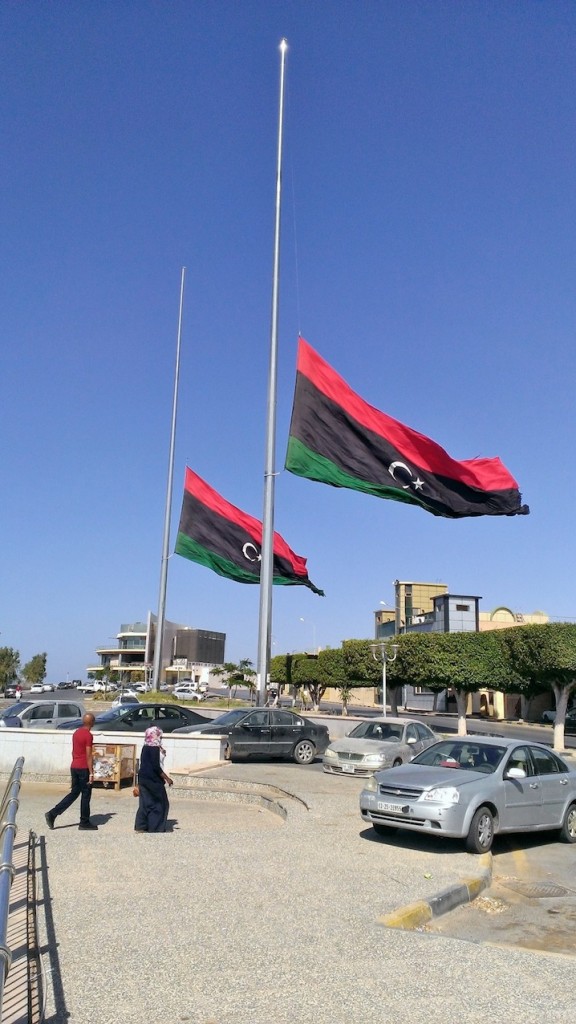By Nihal Zaroug.

Tripoli, 11 June 2013:
The much anticipated vote for a new president of the General National Congress (GNC) to replace . . .[restrict]Mohamed Magarief has been postponed to 16 June because of the Benghazi shootings last Saturday which claimed 31 lives and injured dozens more.
The announcement by the Office of the Presidency of Congress of three days of national mourning for those who died, which ends today, was one of the factors in delaying the vote, according to officials. Another was the fact that several Benghazi and eastern region Congress members are preoccupied with developments related to the tragedy.
Magarief resigned on 28 May ahead of being forced out of office by the Political Isolation Law (PIL), which officially came into effect on 5 June, although so far no one so has been “isolated” as a result.
Some degree of calm appears to have returned to Libya’s bewildered second city which on Sunday held a mass funeral for the victims.
Condolences continue to pour in from across the country, yet there are still no leads into why a seemingly peaceful protest to demand the disbandment of the First Brigade of the Libya Shield Forces (Deraa 1) to make way for national police and army turned fatal.
Deraa 1 has operated under the direct control of Chief of Staff General Yousef Mangoush who resigned on Sunday. Prior to doing so, he announced that the four Shield brigades in Benghazi would hand over their camps and arsenal and become official army units, leading many to question why such a move had not been made months ago.
However, there has been scorn for the idea from Sheikh Ismail Salabi. He was closely connected to the Rafallah Al-Sahati brigade, incorporated into the Shield forces last September in the aftermath of the attack on the of US Benghazi mission and the killing of US Ambassador Chris Stevens. “Which army is going to receive the (Shield) headquarters?” he asked Reuters. “There is no army in Libya other than Deraa Libya”.
In an ominous foreshadowing of Saturday’s events, it was the Rafallah al-Sahati brigade that shot and killed nine protestors who had tried to force their way into the its base following Stevens’ death, demanding it disband.
Following Saturday’s killings, which according to the spokesman for Benghazi’s Joint Security Room included five members of the army’s Special Forces sent in to take control of the Shield headquarters, the Prime Minister immediately ordered the Attorney General and the Interior Ministry to instigate an inquiry into the events. This was then put into law by a GNC ruling which called for the Attorney General to appoint a judge to lead the investigations and demanded that any members of Deraa 1 implicated in the confrontation be brought to justice.
For its part, the National Front Party (NFP) has issued a statement emphasising the need to remove all weapons from Libya’s streets. The right to bear arms, it said, lay with military institutions as sanctioned by the Congress and not with any other group.
However, the families of the victims have issued a statement criticising the GNC decision and calling for tougher measures to be taken against groups such as the Shield forces that continue to operate under the government but are not fully integrated into the state’s official police and military apparatus. Integration into the army must be done on an individual basis and not as whole units, they say.
Former Congressman Hassan Lamin had added to the government’s discomfort saying on the UK’s Sky News that it will be impossible for Libya to build a functioning state if the militias continued to have free rein and exist. Separately, he told the Libya Herald that the nation “could not move forward in any direction or aspect unless security issues are resolved.” Even a newly built hospital could fall prey to these groups and be taken over, a possible scenario if security is not under the total control of the government, said Lamin.
Lamin’s sentiments are thought to be shared by many Libyans, frustrated by the government’s inability to uphold the will of the people and end the rule of militias once and for all.
Meanwhile, the British, French and US governments have put out a joint statement strongly condemning Saturday’s violence in Benghazi. It underlined, they said, the need for “members of all armed groups to be swiftly integrated into state-controlled military and security forces under the rule of law or to return to civilian life”.
For its part the Turkish Foreign Ministry has said that it is “of crucial importance for the future of Libya and the region that problems on the path of democratization in the country are solved without resort to violence and within the framework of common sense and dialogue”. [/restrict]








